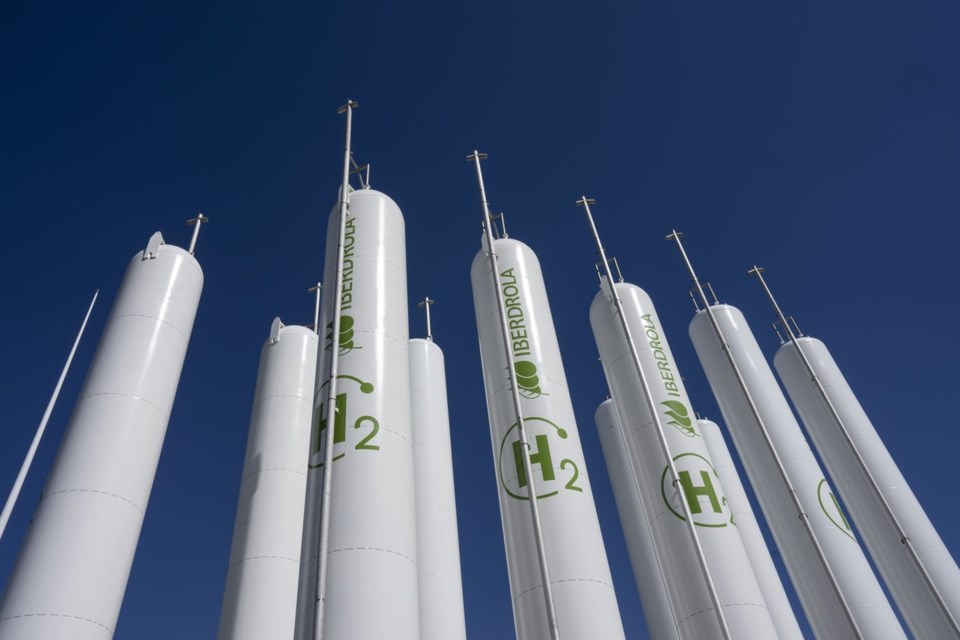ST. JOHN'S — Newfoundland and Labrador is owed millions of dollars in fees from green energy companies, underlining growing doubts about whether promises of major projects and multi-billion dollar investments will pan out.
Six companies are vying to create new operations in the province that would use wind energy to produce hydrogen for exports overseas. Figures obtained by The Canadian Press reveal some owe a collective total of $13.7 million in fees due in 2024 for the use of Crown land.
Russell Williams, an associate political science professor at Memorial University in St. John's, N.L., said he’s not surprised the companies have land fees outstanding.
“I think it highlights the extent to which the public should be skeptical about megaprojects, and about governments getting very carried away, very early, with the idea that there are huge benefits from these kinds of natural resource developments,” Williams said in a recent interview.
However, the province insists the money will be collected.
"The provincial government has not written off any outstanding Crown land reserve fees and expects to collect all revenue owing for these fees," said an emailed statement from Steve Crocker, minister of industry, energy and technology.
The industry began paying the fees after the provincial government invited companies to bid on Crown land to use for wind energy projects in December 2022. By paying the fees, the companies have the option to lease the land if they choose to move forward with projects.
But it's not clear which developments will proceed even though the companies have now reserved roughly 3,944 square kilometres of Crown land.
Executives from the six companies told an energy conference in St. John’s, N.L., last week that it’s been tough to find buyers on the overseas market to make their projects viable.
Some companies said they were considering other options in the meantime, including an anticipated call for renewable energy for the local grid in Newfoundland and Labrador.
"In 2021, 2022 the world thought everything was going to be running on hydrogen," Karlis Povisils, with Copenhagen Infrastructure Partners, told reporters during the conference. "I think the hype has boiled off, and that's a healthy thing. The players that are left are the ones that are serious and committed."
The companies owed a collective total of about $22.1 million in Crown land reserve fees for 2024, Crocker said. The province collected just $8.4 million, according to figures obtained through access to information legislation.
In 2023, the province received $5,491,316 in Crown land reserve fees — exactly the amount it was owed, the department confirmed.
Only three of the six companies confirmed to the Canadian Press their fees were up to date: North Atlantic, Pattern Energy, and the Exploits Valley Renewable Energy Corporation, or EVREC.
Other companies weren't as clear.
A spokesperson for World Energy GH2, which proposed a $16-billion wind-powered hydrogen operation in western Newfoundland, said the company has paid "millions" in Crown land reserve fees. She did not confirm if it had paid all of its fees for 2024.
"We continue to reserve Crown lands, and incur fees related to our reservation, and will continue to service our obligations," Laura Barron said in an email.
A spokesperson for EverWind, which has proposed wind-to-hydrogen projects in Newfoundland and Nova Scotia, said the company has paid $5.6 million in reserve fees, "but we cannot comment further as we are in ongoing land reservation discussions with the province."
EverWind Fuels is one of two companies that have asked the province to reduce the amount of land held in reserve for its proposed development. Using the reduced land reserve, the company would have owed more than $8 million in 2024.
ABO Energy, which is working with Copenhagen Infrastructure Partners on a project in eastern Newfoundland, has also reduced its Crown land reserve. The company said it is working with the government “to ensure compliance” with reserve fee conditions.
“And indeed, we are working to create the ecosystem that this nascent industry demands,” said spokesperson Heidi Kirby in an email.
Tom Cooper, a business professor at Memorial University, said forgoing the land fees could be a way for the province to fund the developments, “without handing over hard cash.”
Williams added that the fees are quite small compared to the cost of some of the projects. He worries the provincial government undervalued its resources and got swept up in "pie-in-the-sky" promises of megaprojects that would produce jobs.
"One of the things that always gets lost in those calculations is the public interest," Williams said. "The public interest here is what kind of royalties and revenues was the province going to get ... and it looks like, unless something changes, the benefits are tiny and in arrears."
This report by The Canadian Press was first published June 12, 2025.
Sarah Smellie, The Canadian Press




